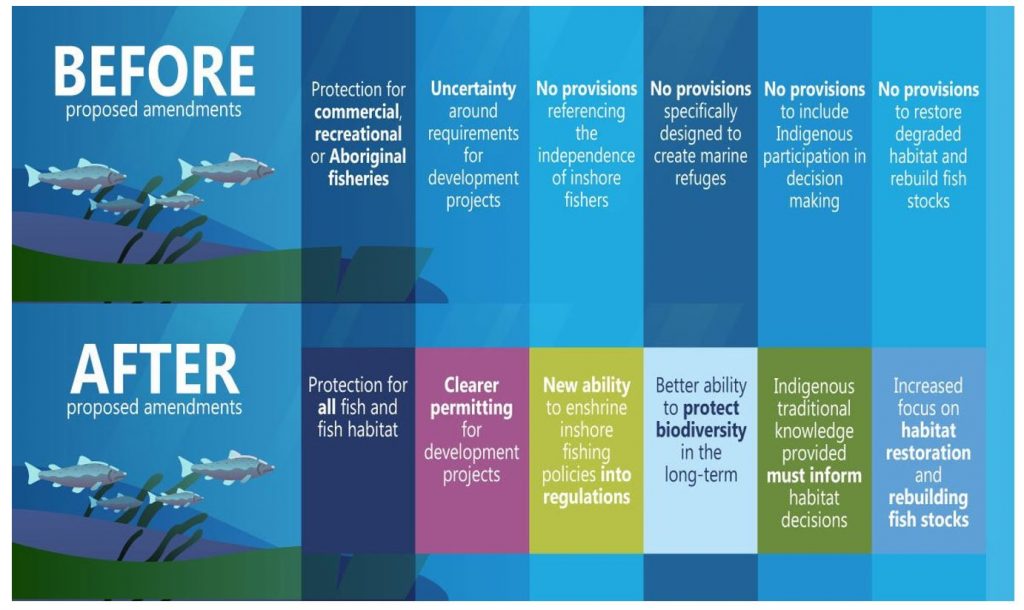Yesterday, the government of Canada announced some proposed amendments to the national Fisheries Act. The full text of the proposal can be viewed here. So far, it’s gone through the First Reading in the House of Commons (for my non-Canadian readers, here is what that means). I reached out to fisheries and conservation policy experts across Canada to ask what they think of these proposed changes.

“On balance, the tabled Fisheries Act is a step forward – it includes a strong purpose – to protect fish and fish habitat, and includes modern principles of fisheries management (precaution, ecosystem approach, science that must be considered in decision making), it includes ability for ministerial orders for biodiversity and conservation. Overall, environmental protections are restored and increased – which is a good thing. The 5 year review process also allows for further strengthening – where opportunities may have been missed.”
-Dr. Susanna Fuller, Marine Coordinator for the Ecology Action Centre. See the Ecology Action Centre’s full statement here.
“Canada’s Fisheries Act is one of the country’s most important environmental laws, and I am glad to see HADD- the general prohibition on causing habitat alteration, damage, or destruction to fish habitat – back. This has historically been one of the best legal checks on damaging development. These proposed amendments will bring this law into the 21st century by focusing on habitat protection as well as restoration, updating the enforcement provisions, requiring Indigenous traditional knowledge to inform habitat decisions, and making fish and fish habitat decisions more transparent through improved public reporting and project tracking.”
–Linda Nowlan, Staff Attorney, West Coast Environmental Law. See West Coast Environmental Law’s full statement here.
“This was worth waiting for… I am generally pleased with the high-level aspects of the proposed Fisheries Act changes. A appreciate the greater focus on restoration which is sorely needed to repair our past mistakes – particularly over the past few years when the Act was weakened. Of course, the implementation is where we must next focus our attention to ensure that the general principles are operationalized in a way that benefit aquatic ecosystems and support the ecosystem services they provide. All eyes will be on the upcoming budget. Moving forward I am hopeful that the dialogue that has happened over the past few years will continue so we can further refine the Act and its associated policies to ensure our front line practitioners are able to deliver on evidence-based management and conservation.”
–Dr. Steven Cooke, Canada Research Chair and Director of the Canadian Centre for Evidence-Based Conservation and Environmental Management, Carleton University
“I am very happy to see an unambiguous restoration of the requirement to protect fish habitat. This is critical. It never should have been removed in the first place. I am similarly very happy to see language about rebuilding stocks included in this bill. However, it still gives a ton of discretionary power to the Minister to determine whether to actually engage in rebuilding. I would like to see less discretionary power here. If a stock is depressed, it should be rebuilt. Full stop. The public registry is a great idea. We need to do way better at making Canadian fish and fisheries data accessible. Ultimately I think this bill is a step in the right direction.”
–Dr. Brett Favaro, School of Fisheries, Fisheries and Marine Institute of Memorial University
“It’s been years of work to reverse the changes made to the Fisheries Act in 2012. This bill hits the right chords to protect fish and their habitats. I’m relieved that all the hard work to protect fish has paid off.”
-Jeffrey Young, senior science and policy analyst at the David Suzuki Foundation. See the David Suzuki Foundation’s full statement here.
“Overall, this legislation is a solid start. It not only “restores lost protections” but goes further and includes provisions that in my view will make the habitat protection regime both more effective and efficient. Most notable in this respect are the provisions for a public registry, which will bring some much needed transparency to the regime, as well as the provisions for habitat banking. Habitat banking isn’t a panacea, but if done properly should maximize the value of offsetting efforts. In terms of improvement, I agree with others that the proposed legislation is still too discretionary; I would like to see some objective criteria to at least constrain the Minister’s decision-making in certain contexts (e.g. fish stocks and flow levels for fish). My biggest concern is that the proposed legislation appears geared primarily towards major projects, and that smaller projects may continue to be dealt with through opaque policy instruments like Letters of Advice that are not subsequently monitored by the Department. Streamlining may be necessary, but then so is ensuring that the Department has the information it needs to manage cumulative effects.”
–Martin Olszynski, University of Calgary Faculty of Law
Other comments and coverage:
- Coverage on CBC
- Press release from the Canadian Environmental Law Association
- Coverage in the National Observer
- Video description of the proposed changes from Fisheries and Oceans Canada
- Coverage in the Globe and Mail
- Blog post in Desmog Canada.
If you appreciate my shark research and conservation outreach, please consider supporting me on Patreon! Any amount is appreciated, and supporters get exclusive rewards!